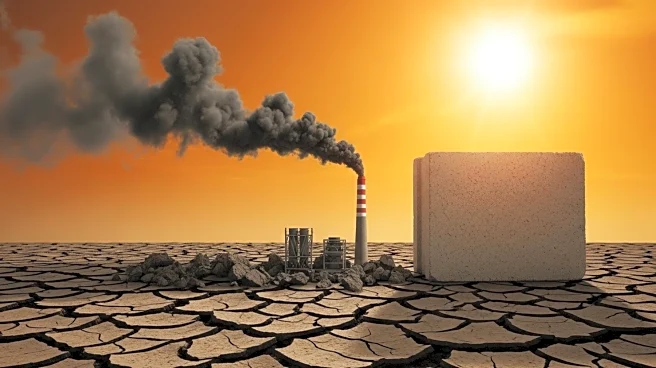What is the story about?
What's Happening?
A recent study published in Nature reveals that emissions from the world's largest fossil fuel and cement producers have significantly contributed to the intensity of heatwaves globally. Researchers from ETH Zurich analyzed over 200 heatwaves from 2000 to 2023, finding that emissions from these 'carbon majors' are responsible for about half of the increase in heatwave intensity compared to preindustrial times. The study employed extreme event attribution methods to link specific emissions sources to increased global warming and its impacts on extreme weather events. The findings suggest that emissions from these companies have made heatwaves more frequent and intense, with significant implications for climate accountability and legal liability.
Why It's Important?
The study's findings underscore the substantial role that major carbon emitters play in exacerbating climate change and its effects, particularly extreme heat events. This research is crucial for informing climate accountability initiatives, including litigation against fossil fuel companies for climate damages. The study provides a scientific basis for potential legal actions, as it quantifies the contribution of specific companies to the increased intensity and likelihood of heatwaves. This could lead to significant financial and reputational consequences for these companies, as they may be held liable for climate-related harms. Additionally, the research highlights the urgent need for policy changes to reduce emissions and mitigate climate change impacts.
What's Next?
The study's results are likely to influence ongoing and future litigation efforts against major fossil fuel companies, as it provides evidence of their contribution to climate change-related damages. Legal actions, such as those already underway in the United States, may gain momentum as more evidence is presented linking emissions to specific climate events. Policymakers may also use this research to push for stricter regulations on emissions and accelerate the transition to renewable energy sources. The study serves as a reminder of the importance of phasing out fossil fuels to prevent further climate-related disasters.
Beyond the Headlines
Beyond its legal implications, the study highlights the ethical responsibility of major carbon emitters in contributing to climate change. It raises questions about corporate accountability and the moral obligation of these companies to address their environmental impact. The research also emphasizes the need for global cooperation in tackling climate change, as the effects of emissions are felt worldwide. Long-term shifts in public perception and policy may result from increased awareness of the direct link between corporate emissions and climate events.

















